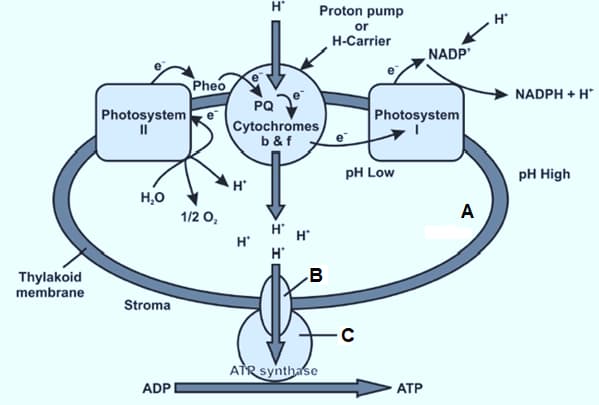Photochemical Phase of Photosynthesis
Photochemical Phase of Photosynthesis: Overview
This Topic covers sub-topics such as Noncyclic Photophosphorylation, Chemiosmotic Hypothesis, Cyclic Photophosphorylation, Photo Phosphorylation, Cytochrome, Absorption Spectrum, Nicotinamide Adenine Dinucleotide Phosphate, Light Reaction and, ATP Synthase
Important Questions on Photochemical Phase of Photosynthesis
Through the use of oxygen-18 (heavy oxygen), scientists have found that the oxygen released during photosynthesis comes from molecules of:
Which one of the following categories of organisms do not evolve oxygen during photosynthesis?
Hill reaction occurs in
Why is NADPH not formed during cyclic photophosphorylation?
Identify the correct statement about thylakoid membrane that makes those the sites of light-dependent reaction in photosynthesis.
(i) Carbon dioxide and water can diffuse through the thylakoid membrane.
(ii) Photosystem-II anchored to the thylakoid membrane is involved in both cyclic and non-cyclic photophosphorylation.
(iii) Cytochrome complex embedded in the thylakoid membrane creates proton gradient.
(iv) Thylakoid membrane with pigment and protein complexes has the capability of harvesting light.
A student working in a lab had three tubes with the following preparations:
(i) Freshly extracted nucleic acids dissolved in a buffer.
(ii) Chlorophyll extracted from spinach leaf.
(iii) Red coloured anthocyanin from onion cells.
The student used a spectrophotometer to determine the wavelength of light at which each preparation would show maximum absorption (absorption spectrum). She noted down the values in her notebook. However, when she came to the lab the next day, she realised that she had not mentioned the name of the sample preparation against each value. The values she recorded were 480 nm, 260 nm, and 642 nm. The respective values for the sample (i), (ii), and (iii) would most likely be:
The chlorophyll molecule in reaction centre of PS II has maximum absorption at:
Photophosphorylation occurs in
During non-cyclic photophosphorylation, in which of the following, produced through photolysis (splitting of water) will enter:
Splitting of water during photochemical reactions is associated with:
Cyclic photophosphorylation releases:
The protons are accumulated in the ….. during photophosphorylation process.
Identify the labels, and from the figure provided and select the correct option:

Identify the correct matched pair from the following:
Photolysis (splitting) of water is associated with:
Stroma lamellae are devoid of
Choose the correct statement(s) from the following regarding light reactions taking place in the chloroplast.
(i) The ion concentration of thylakoid lumen is higher than stroma.
(ii) Flow of ions through ATP synthase drives phosphorylation of adenosine diphosphate.
(iii) The electrons from the photolysis reaction of are passed to the photosystem II.
Elements found in ferredoxin are
Which of the following elements plays a role in photolysis of ?
Non-cyclic photophosphorylation does NOT occur in _______.
